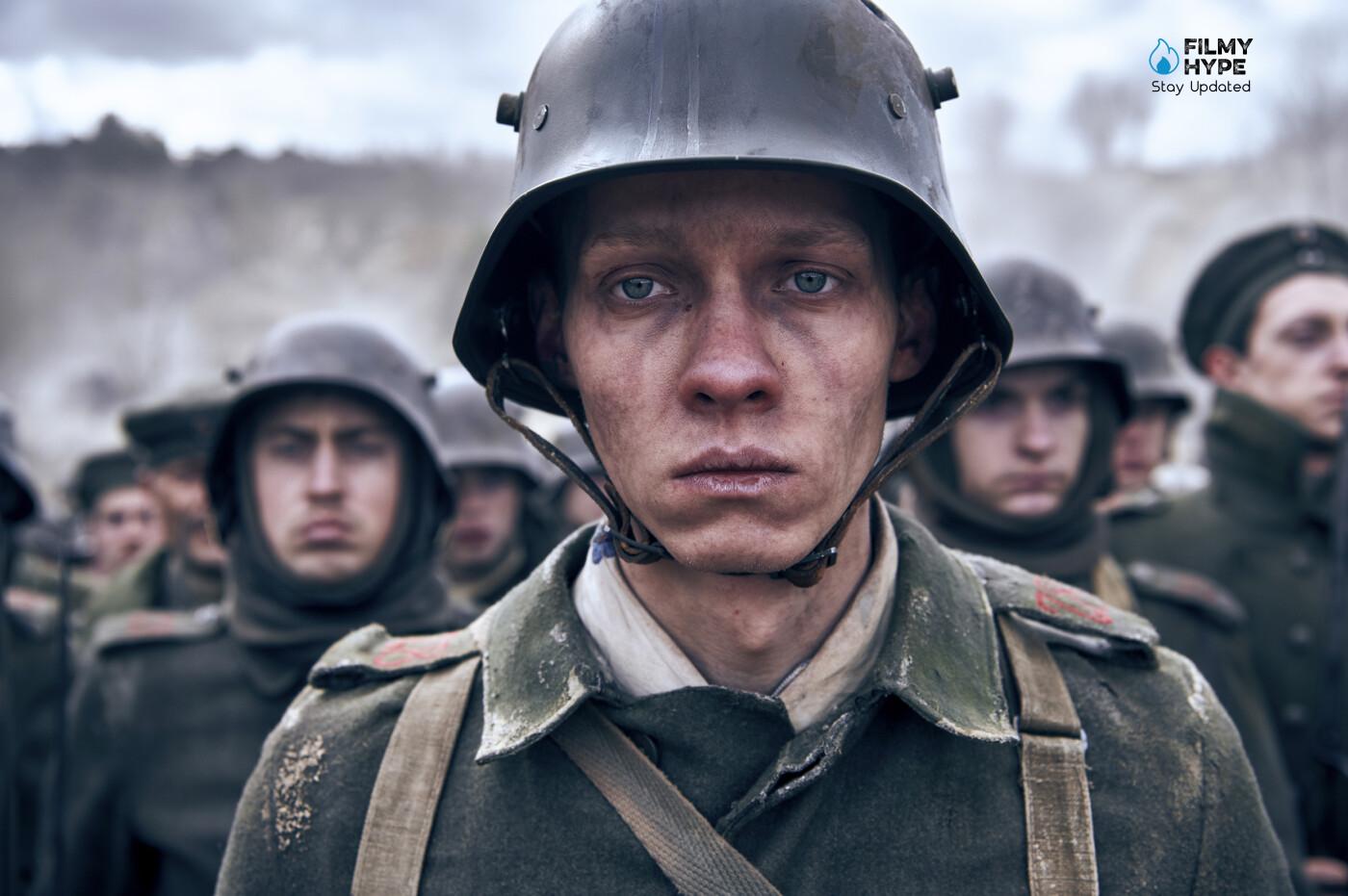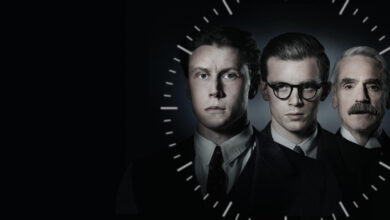All Quiet on the Western Front Review: Both in The Literary Matrix and Its Cinematographic Transposition
Cast: Felix Kammerer, Daniel Brühl, Albrecht Schuch
Director: Edward Berger
Streaming Platform: Netflix
Filmyhype.com Rating: 4.5/5 (four and a half stars)
It was the year 1928 when in November and December the German newspaper Vossische Zeitung published for the first time the historical novel All Quiet on the Western Front by Erich Maria Remarque (pseudonym of Erich Paul Remark), considered by many to be fundamental for literature. war and criticism of the war. Pages, his own, which soon turned into a real indictment hurled against the uselessness of conflicts, ideologies and the use of violence as an instrument of conquest, destruction, death and the claim of military power. It is no coincidence that it was censored and banned for many decades by nations, including Italy, which saw in the words of the writer from Osnabrück an authentic threat.

However, it will not be long before the Seventh Art understood its moral and historiographic importance, to the point of deciding to adapt the pages of All Quiet on the Western Front after only two years after its publication with the version signed by Lewis Milestone, to which a second one will follow for the small screen, the TV movie by Delbert Mann of 1979. But as they say, there are no two without three and here is a third one, directed by Edward Berger, which this time arrives directly in the catalogue of a streaming platform, to be precise on that Netflix from 28 October 2022. Three attempts in as many distant eras, which reflect technological developments and new methods of use, but which despite the changes do not affect the contents. Those remain unchanged, with the passing of the clock hands that have not affected their importance, specific weight and capacity.
All Quiet on the Western Front Review: The Story
Paul Baümer is a seventeen-year-old student who decides to volunteer in the German army after being struck by the patriotic speech of one of his professors. He then leaves for the Western Front together with a handful of comrades, but when he is in the trenches and after the first bombing, his initial idealism leaves room for despair and fear. The young recruit experiences the horrors of the First World War firsthand and witnesses the death of his comrades as he becomes the cause of death for other soldiers. His only hope is to remain strongly attached to his humanity. This is broadly the plot of All Quiet on the Western Front, in which the young protagonist Paul Baümer is played by Felix Kammerer. Daniel Brühl (Goodbye, Lenin!, Inglourious Basterds, Rush, The King’s Man – Origins ) plays a politician worried about Germany’s grave death toll and the knowledge that the country is facing defeat.
The cast also includes Albrecht Schuch, Aaron Hilmer and Edin Hasanovic who respectively play soldiers Tjaden Stackfleet, Albert Kropp and Stanislaus Katczinsky. The first is a seasoned veteran soldier, the second a friend of Paul, and the third plays a central role in history as a guide to younger comrades. Devid Striesow plays the role of an inflexible German general who, despite the enormous losses among German soldiers, does not intend to surrender and Thibault de Montalembert is an allied military leader. Remarque’s novel was banned in several countries due to the very strong anti-militarist message that conveyed. Edward Berger’s film, with the same intentions, plunges the viewer into the horrors of the First World War, between fear, devastation and death through harsh and crude images of life in the trenches.
All Quiet on the Western Front Review and Analysis
The Wolfsburg director draws on the pages of All Quiet on the Western Front to turn it into an anti-militarist parable, which today, more than a century after that conflict and with Europe still upset and marred by yet another useless war, thunders on the screen like lightning on stormy days. Berger’s film, which he co-wrote with Lesley Paterson and Ian Stokell, draws heavily on the novel of the same name, taking us back to the last days preceding the armistice and the consequent end of the First World War, on which much of the focus is of the 150 minutes that make up the timeline. All with and through the eyes of Paul Bäumer, a young university student who decides to voluntarily enlist in the German imperial army along with other friends just nineteen on the fly of the western front. There, in the mud mixed with blood that bathes the trenches, under bombing and mortar discharges, the initial euphoria immediately turns into despair, shattering the patriotic ideals they had instilled in it. All while his fellow travellers to hell are mowed down one after the other by the dullness of their superiors and the determination of the enemy.
Paul, played in All Quiet on the Western Front with expressive power, emotional involvement and different levels of intensity by a very good Felix Kammerer (young promise of German cinema that we will certainly hear about in the future), becomes the “raft” to which the viewer it clings all the time while crossing the cyclone which in the meantime sweeps away things and people. The narrative both in the literary matrix and in its transposition assumes its perspective and point of view. The mind in this sense returns to the modus operandi of Sam Mendes in his Di Lui 1917, which uses a combination of long takes stitched together to generate a swirling sequence shot and with it glues to the young Colonel Lance Schofield following him on his mission. In the same way, with and through the simple soldier opposed to him, that is Bäumer, we live the events of the great history, as he slowly marches (those rare times that he has been granted) towards the armistice and death, in a war that has his heavy and dramatic legacy was made of immobility and enormous human losses. The camera obsessively follows him on and off the battlefield, between charges and bayonet assaults, between mass graves, bunkers and trenches flooded by pouring rain, to abandon him to his fate only for short periods that take us away from the first line, All Quiet on the Western Front, therefore, moves along two lines, the physical one of the mud of the Argonne, the Champagne or the Somme, where you fight night and day with an enemy that seems invisible, and that of the salons of the bureaucrats and the so-called lords of the war.

But between the two fronts to remain central in the story is the first that, as in any self-respecting war movie, treads his hand on the physical and psychological consequences, as well as military and political, that war causes in those who live it on their skin. In this, the staging and painting become fundamental, with the materialization of the effects of horror and violence that prevail over the story. And, as happens in the vast majority of cases, with rare exceptions, when it comes to stories set during a conflict, the deepening of the characters takes a back seat to leave room for the manifestation of war, it’s “ballistic and dynamite show”.
All Quiet on the Western Front in this sense is no exception, with the production providing capital and manpower to give the director the means necessary to deliver a technically noteworthy result. Berger, with the complicity of the work of the excellent director of photography James Friend, takes the opportunity to bring home a solid war drama that can compete openly in the international market.
All Quiet on the Western Front Review: The Last Words
The direction offers imposing and impactful scenes that restore the spectacularity of the actions and at the same time the epic dimension that is an integral part of the DNA of films that can be inscribed in the vein in question. The filmmaker opens with a fight scene and at regular intervals brings others to the screen in which the smell of blood and death seems to accompany the sight. In this, his version of All Quiet on the Western Front seems to have found a compromise between Horizons of Glory and the aforementioned 1 917 if one decides to remain anchored to the historical period and in this Berger was really up to the occasion.






